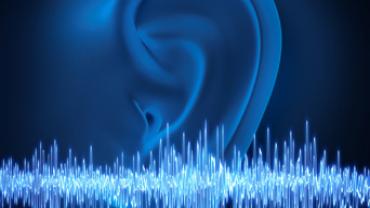
The sense of hearing is certainly a wonderful gift yet it is one that is widely taken for granted that is until noticeable changes start to occur. For many hearing loss is simply accepted as part of the aging process. However age-related hearing loss leads to difficulties and frustrations with everyday communication and can greatly contribute to the loneliness and depression that is so pervasive among the elderly. The inescapable reality exists that aging elicits some degree of hearing loss and associated tinnitus in most individuals. According to the National Institute on Deafness and Other Communication Disorders (NIDCD) 18 percent of American adults 45-64 years old 30 percent of adults 65-74 years old and 47 percent of adults 75 years old or older have a hearing loss. While some cases can be attributed to long hours spent in a loud factory listening to loud music or frequent exposure to high pitch sounds (all of which may produce irreparable hearing loss) it is hopeful to note that there are dietary measures that can be taken to reduce potential hearing loss and preserve this important sensory tool in spite of aging.
Recent studies have been exploring the possible relationship between omega-3 polyunsaturated fatty acids (PUFAs) and hearing loss. It appears that inadequate dietary intake of omega-3 PUFAs via regular consumption of fish or fish oil supplements is significantly related to the prevalence of age-related hearing loss. A cohort study of 2956 human participants (aged 50 y) with age-related hearing loss was evaluated for dietary intakes of PUFAs. Frequency of fish intake and/or fish oil supplements was compared to the degree of hearing loss which was evaluated at 5-year and 10-year intervals. Among those who consumed fish two or more times each week there was a 42 percent reduction in the risk of developing hearing loss. Additionally there was a direct longitudinal correlation between total omega-3 PUFA intake and the degree of hearing loss experienced. In a cross-sectional 3 year study of 720 human subjects (aged 50 to 70 years) with age-related hearing loss those with the highest levels of plasma omega-3 PUFA levels were found to have the lowest degrees of low-frequency hearing loss which is the most common type of hearing loss associated with aging and degeneration.
While the specific mechanism of action by omega-3 PUFAs is still under investigation many legitimate theories are currently being offered. It is a widely known and well-accepted fact that omega-3 PUFAs support healthy blood flow by improving lipid profiles vessel inflammation blood pressure and clotting factors. As a result fish consumption and omega-3 supplements have often been recommended for cardiovascular health. However age-related hearing loss is also associated in part with decreases in blood flow to the cochlea leading to cochlear degeneration and associated hearing loss. If omega-3 PUFAs support the cardiovascular system improve blood flow and protect blood vessels from damage and inflammation it is reasonable to assume that the cochlea would reap these benefits and hearing loss would be deferred and/or potentially arrested. Moreover adequate levels of omega-3 PUFAs delay cell aging by strengthening cell membranes and protecting DNA. By protecting the sensitive hair cells of the cochlea omega-3 PUFAs can support the overall wellness of the inner ear preventing damage that would lead to hearing loss and tinnitus.
It is a wise idea at virtually any age to safeguard the delicate structures of our ears as best we can. We should all be cognizant of limiting our exposure to a barrage of loud noises (i.e. firecrackers power tools high decibel concerts even extended periods of time using personal listening devices that require earbuds). Yet it is encouraging to know that nutritional support from omega-3s through adequate fish consumption and additional supplementation can be beneficial in helping to protect the gift of hearing.